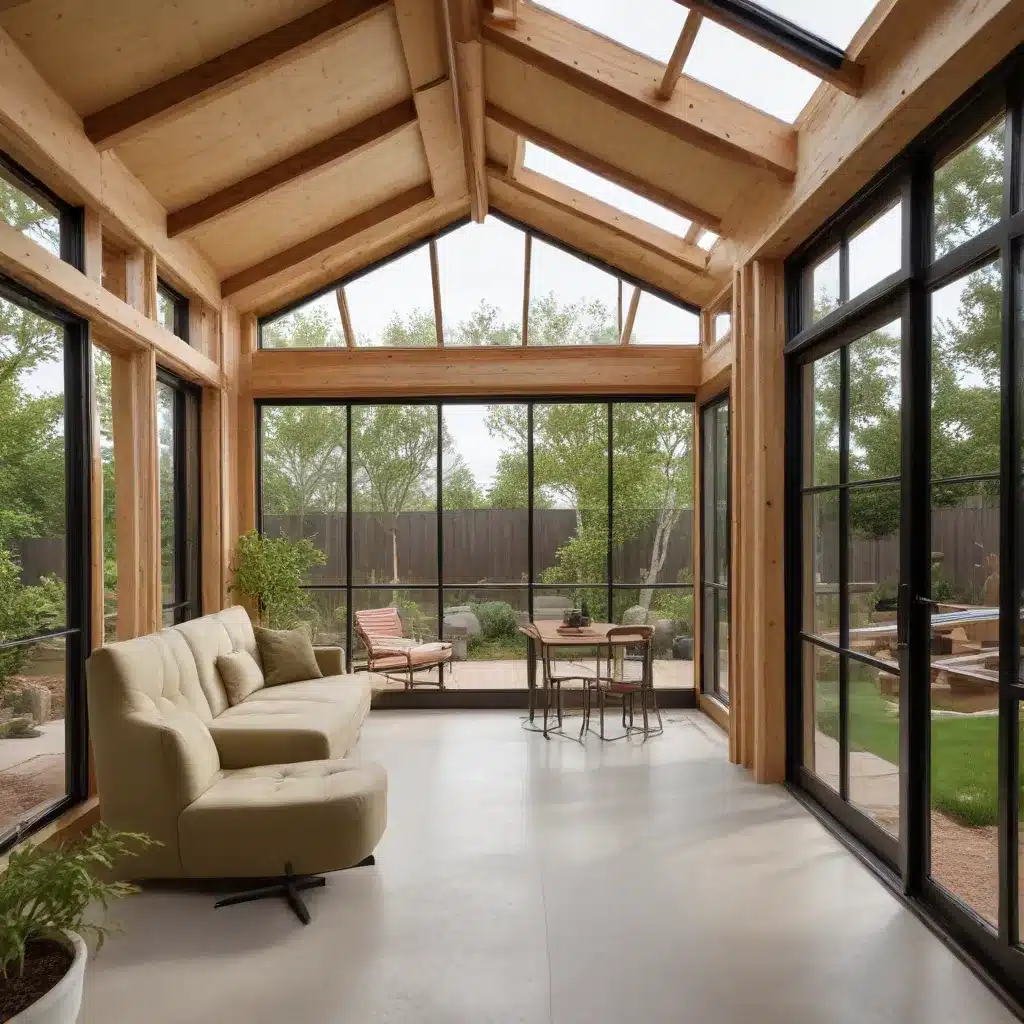
Sustainable Home Extensions: Enhancing Sustainable Building and Modular Customization
In today’s world, where environmental consciousness is paramount, the concept of sustainable home extensions has become increasingly prevalent. As an experienced home extension consultant, I’m excited to guide you through the fascinating realm of sustainable building principles, modular construction techniques, and customization approaches that can transform your living space into an eco-friendly oasis.
Sustainable Building Principles
At the heart of sustainable home extensions lies a deep commitment to minimizing our environmental impact. This begins with the careful selection of renewable materials that not only enhance the aesthetic appeal of your home but also contribute to its long-term sustainability.
Renewable Materials: From reclaimed wood and recycled steel to bamboo and cork, the options for eco-friendly materials are vast and varied. These natural, responsibly sourced resources not only reduce waste but also add unique character to your extension, seamlessly blending modern design with environmental stewardship.
Energy Efficiency: Sustainable home extensions go beyond mere aesthetics; they prioritize energy efficiency to create a comfortable and cost-effective living environment. Cutting-edge insulation techniques, such as structural insulated panels (SIPs) and advanced weatherproofing, work in tandem to minimize heat loss and optimize thermal comfort, reducing your energy consumption and carbon footprint.
Water Conservation: Water is a precious resource, and sustainable home extensions address this by incorporating water-saving features like low-flow fixtures, rainwater harvesting systems, and greywater recycling. These innovations not only reduce your environmental impact but also help you save on utility bills, making your home extension a true testament to eco-friendly living.
Modular Building Techniques
One of the key advantages of sustainable home extensions is the use of modular building techniques. Prefabrication and adaptable designs allow for a more efficient and environmentally conscious construction process.
Prefabrication: Modular homes are constructed in a controlled factory setting, minimizing waste, streamlining the building process, and ensuring quality craftsmanship. These prefabricated components are then transported to the site and assembled, reducing construction time and disruption to your daily life.
Adaptable Designs: Modular construction offers unparalleled flexibility, enabling you to customize your home extension to suit your evolving needs. Modular components can be easily reconfigured, expanded, or even disassembled and repurposed, ensuring that your investment remains relevant and valuable over time.
Disassembly and Reuse: When the time comes to update or relocate, sustainable home extensions can be disassembled with minimal effort, allowing for the reuse of materials and components. This circular approach to construction minimizes waste and aligns with the principles of a sustainable future.
Customization Approaches
Sustainable home extensions are not one-size-fits-all solutions; they are tailored to your unique preferences and lifestyle requirements. By embracing customization, you can create a living space that truly reflects your personal style and enhances your overall well-being.
User Preferences: Whether you’re drawn to the timeless charm of a traditional architectural style or the sleek, modern aesthetics of a contemporary design, sustainable home extensions can be customized to suit your tastes. Spatial requirements, such as the number of bedrooms, open-concept layouts, or dedicated work-from-home areas, can be seamlessly incorporated into the design.
Flexibility in Design: Modular construction allows for a remarkable degree of flexibility, empowering you to create a space that evolves with your needs. Scalable layouts, interchangeable components, and personalization options enable you to fine-tune your home extension, ensuring it remains a perfect fit for your family now and in the years to come.
Enhancing Sustainability
Sustainable home extensions go beyond just aesthetic appeal and energy efficiency; they actively work to minimize the environmental impact throughout their entire lifecycle.
Environmental Impact: By reducing construction waste, utilizing recycled and renewable materials, and minimizing emissions during the building process, sustainable home extensions set a new standard for eco-friendly living. Furthermore, integrating elements like green roofs, solar panels, and wildlife-friendly landscaping can help restore and protect the natural ecosystems surrounding your home.
Lifecycle Considerations: Sustainable home extensions are designed with the long term in mind. Carefully selected materials, durable construction methods, and adaptable designs ensure that your investment retains its value and functionality for years to come. When the time comes to retire or relocate, the modular nature of these extensions allows for seamless disassembly and reuse of components, further reducing waste and environmental impact.
Benefits of Sustainable Extensions
Embracing sustainable home extensions not only benefits the environment but also enhances your overall quality of life, providing a healthier, more comfortable, and more valuable living space.
Improved Livability: Sustainable home extensions prioritize thermal comfort, daylighting, and indoor air quality, creating a harmonious and rejuvenating living environment. Advanced ventilation systems, energy-efficient windows, and strategic placement of natural light work in tandem to promote physical and mental well-being.
Long-Term Value: The resource efficiency, low maintenance requirements, and resilience of sustainable home extensions translate into significant long-term savings. From reduced energy bills to increased resale potential, your investment in an eco-friendly extension will continue to pay dividends long into the future.
As an experienced home extension consultant, I can confidently say that sustainable home extensions are not just a passing trend; they are the future of residential construction. By embracing renewable materials, modular building techniques, and customized design, you can create a living space that not only enhances your quality of life but also serves as a testament to your commitment to environmental stewardship.
So, if you’re ready to embark on a journey towards a more sustainable and personalized living experience, let’s explore the possibilities of a sustainable home extension together. Your dream of an eco-friendly, adaptable, and beautifully crafted living space is within reach.
















